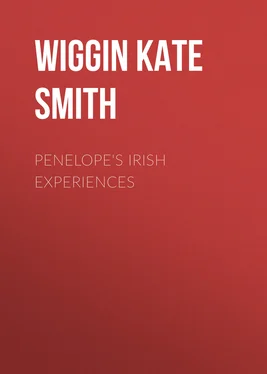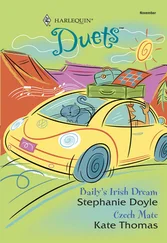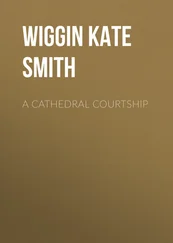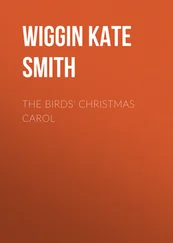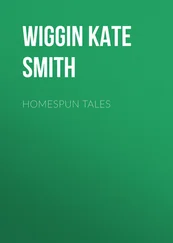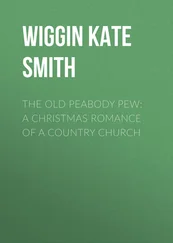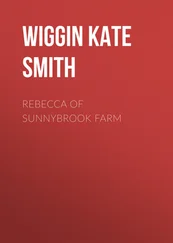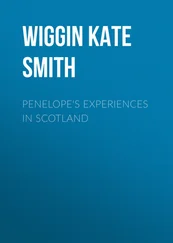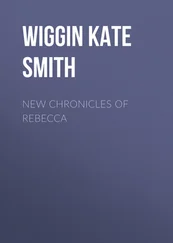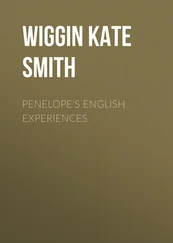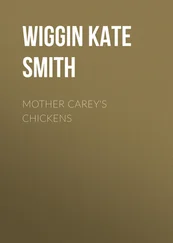Kate Wiggin - Penelope's Irish Experiences
Здесь есть возможность читать онлайн «Kate Wiggin - Penelope's Irish Experiences» — ознакомительный отрывок электронной книги совершенно бесплатно, а после прочтения отрывка купить полную версию. В некоторых случаях можно слушать аудио, скачать через торрент в формате fb2 и присутствует краткое содержание. Издательство: Иностранный паблик, Жанр: foreign_prose, foreign_antique, на английском языке. Описание произведения, (предисловие) а так же отзывы посетителей доступны на портале библиотеки ЛибКат.
- Название:Penelope's Irish Experiences
- Автор:
- Издательство:Иностранный паблик
- Жанр:
- Год:неизвестен
- ISBN:нет данных
- Рейтинг книги:3 / 5. Голосов: 1
-
Избранное:Добавить в избранное
- Отзывы:
-
Ваша оценка:
- 60
- 1
- 2
- 3
- 4
- 5
Penelope's Irish Experiences: краткое содержание, описание и аннотация
Предлагаем к чтению аннотацию, описание, краткое содержание или предисловие (зависит от того, что написал сам автор книги «Penelope's Irish Experiences»). Если вы не нашли необходимую информацию о книге — напишите в комментариях, мы постараемся отыскать её.
Penelope's Irish Experiences — читать онлайн ознакомительный отрывок
Ниже представлен текст книги, разбитый по страницам. Система сохранения места последней прочитанной страницы, позволяет с удобством читать онлайн бесплатно книгу «Penelope's Irish Experiences», без необходимости каждый раз заново искать на чём Вы остановились. Поставьте закладку, и сможете в любой момент перейти на страницу, на которой закончили чтение.
Интервал:
Закладка:
She adds a few other details for the instruction of her sister Anne:—
‘Heads are variously adorned; pompons with some accompaniment of feathers, ribbons, or flowers; lappets in all sorts of curli-murlis; long hoods are worn close under the chin; the ear-rings go round the neck(!), and tie with bows and ends behind. Night-gowns are worn without hoops.’
Part Second—Munster
Chapter VII. A tour and a detour
‘“An’ there,” sez I to meself, “we’re goin’ wherever we go,
But where we’ll be whin we git there it’s never a know
I’ll know.”’
We had planned to go direct from Dublin to Valencia Island, where there is not, I am told, ‘one dhry step ‘twixt your fut an’ the States’; but we thought it too tiring a journey for Benella, and arranged for a little visit to Cork first. We nearly missed the train owing to the late arrival of Salemina at the Kingsbridge station. She had been buying malted milk, Mellin’s Food, an alcohol lamp, a tin cup, and getting all the doctor’s prescriptions renewed.
We intended, too, to go second or third class now an then, in order to study the humours of the natives, but of course we went ‘first’ on this occasion on account of Benella. I told her that we could not follow British usage and call her by her surname. Dusenberry was too long and too—well, too extraordinary for daily use abroad.
“P’r’aps it is,” she assented meekly; “and still, Mis’ Beresford, when a man’s name is Dusenberry, you can’t hardly blame him for wanting his child to be called by it, can you?”
This was incontrovertible, and I asked her middle name. It was Frances, and that was too like Francesca.
“You don’t like the sound o’ Benella?” she inquired. “I’ve always set great store by my name, it is so unlikely. My father’s name was Benjamin and my mother’s Ella, and mine is made from both of ‘em; but you can call me any kind of a name you please, after what you’ve done for me,” and she closed her eyes patiently.
‘Call me Daphne, call me Chloris,
Call me Lalage or Doris,
Only, only call me thine,’
which is exactly what we are not ready to do, I thought, in a poetic parenthesis.
Benella looks frail and yet hardy. She has an unusual and perhaps unnecessary amount of imagination for her station, some native common-sense, but limited experience; she is somewhat vague and inconsistent in her theories of life, but I am sure there is vitality, and energy too, in her composition, although it has been temporarily drowned in the Atlantic Ocean. If she were a clock, I should think that some experimenter had taken out her original works, and substituted others to see how they would run. The clock has a New England case and strikes with a New England tone, but the works do not match it altogether. Of course I know that one does not ordinarily engage a lady’s-maid because of these piquant peculiarities; but in our case the circumstances were extraordinary. I have explained them fully to Himself in my letters, and Francesca too has written pages of illuminating detail to Ronald Macdonald.
The similarity in the minds of men must sometimes come across them with a shock, unless indeed it appeals to their sense of humour. Himself in America, and the Rev. Mr. Macdonald in the north of Scotland, both answered, in course of time, that a lady’s-maid should be engaged because is a lady’s-maid and for no other reason.
Was ever anything duller than this, more conventional, more commonplace or didactic, less imaginative? Himself added, “You are a romantic idiot, and I love you more than tongue can tell.” Francesca did not say what Ronald added; probably a part of this same sentence (owing to the aforesaid similarity of men’s minds), reserving the rest for the frank intimacy of the connubial state.
Everything looked beautiful in the uncertain glory of the April day. The thistle-down clouds opened now and then to shake out a delicate, brilliant little shower that ceased in a trice, and the sun smiled through the light veil of rain, turning every falling drop to a jewel. It was as if the fairies were busy at aerial watering-pots, without any more serious purpose than to amuse themselves and make the earth beautiful; and we realised that Irish rain is as warm as an Irish welcome, and soft as an Irish smile.
Everything was bursting into new life, everything but the primroses, and their glory was departing. The yellow carpet seemed as bright as ever on the sunny hedgerow banks and on the fringe of the woods, but when we plucked some at a wayside station we saw that they were just past their golden prime. There was a grey-green hint of verdure in the sallows that stood against a dark background of firs, and the branches of the fruit-trees were tipped with pink, rosy-hued promises of May just threatening to break through their silvery April sheaths. Raindrops were still glistening on the fronds of the tender young ferns and on the great clumps of pale, delicately scented bog violets that we found in a marshy spot and brought in to Salemina, who was not in her usual spirits; who indeed seemed distinctly anxious.
She was enchanted with the changeful charm of the landscape, and found Mrs. Delany’s Memoirs a book after her own heart, but ever and anon her eyes rested on Benella’s pale face. Nothing could have been more doggedly conscientious and assiduous than our attentions to the Derelict. She had beef juice at Kildare, malted milk at Ballybrophy, tea at Dundrum; nevertheless, as we approached Limerick Junction we were obliged to hold a consultation. Salemina wished to alight from the train at the next station, take a three hours’ rest, then jog on to any comfortable place for the night, and to Cork in the morning.
“I shall feel much more comfortable,” she said, “if you go on and amuse yourselves as you like, leaving Benella to me for a day, or even for two or three days. I can’t help feeling that the chief fault, or at least the chief responsibility, is mine. If I hadn’t been born in Salem, or hadn’t had the word painted on my trunk in such red letters she wouldn’t have fainted on it, and I needn’t have saved her life. It is too late to turn back now; it is saved, or partly saved, and I must persevere in saving it, at least until I find that it’s not worth saving.”
“Poor darling!” said Francesca sympathisingly. “I’ll look in Murray and find a nice interesting place. You can put Benella to bed in the Southern Hotel at Limerick Junction, and perhaps you can then drive within sight of the Round Tower of Cashel. Then you can take up the afternoon train and go to—let me see—how would you like Buttevant? (Boutez en avant, you know, the ‘Push forward’ motto of the Barrymores.) It’s delightful, Penelope,” she continued; “we’d better get off, too. It is a garrison town, and there is a military hotel. Then in the vicinity is Kilcolman, where Spenser wrote the Faerie Queene: so there is the beginning of your literary pilgrimage the very first day, without any plotting or planning. The little river Aubeg, which flows by Kilcolman Castle, Spenser called the Mulla, and referred to it as ‘Mulla mine, whose waves I whilom taught to weep.’ That, by the way, is no more than our Jane Grieve could have done for the rivers of Scotland. What do you say? and won’t you be a ‘prood woman the day’ when you sign the hotel register ‘Miss Peabody and maid, Salem, Mass., U.S.A’”
I thought most favourably of Buttevant, but on prudently inquiring the guard’s opinion, he said it was not a comfortable place for an invalid lady, and that Mallow was much more the thing. At Limerick Junction, then, we all alighted, and in the ten minutes’ wait saw Benella escorted up the hotel stairway by a sympathetic head waiter.
Читать дальшеИнтервал:
Закладка:
Похожие книги на «Penelope's Irish Experiences»
Представляем Вашему вниманию похожие книги на «Penelope's Irish Experiences» списком для выбора. Мы отобрали схожую по названию и смыслу литературу в надежде предоставить читателям больше вариантов отыскать новые, интересные, ещё непрочитанные произведения.
Обсуждение, отзывы о книге «Penelope's Irish Experiences» и просто собственные мнения читателей. Оставьте ваши комментарии, напишите, что Вы думаете о произведении, его смысле или главных героях. Укажите что конкретно понравилось, а что нет, и почему Вы так считаете.
